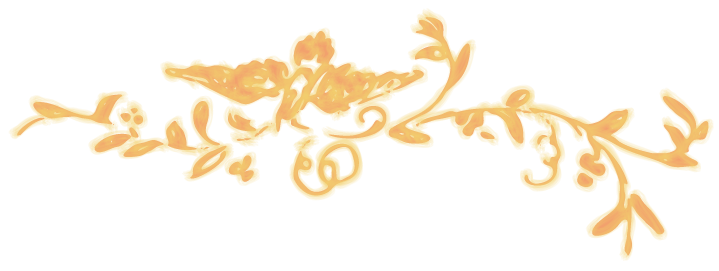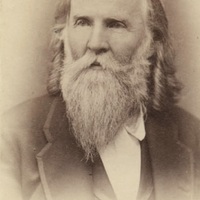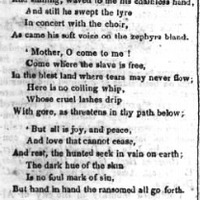Dying Slave Mother, The
Reprint of the poem in the Vermont Telegraph March 9, 1842, p. 4
From the Liberty Bell
THE DYING SLAVE MOTHER
by g. s. burleigh
Come to my dying bed,
Brother, and raise my head,
That I may see yon sunset clouds awhile,
That in bright colors drest,
Hang o'er the blushing West.
Cloud upon cloud upheaved, a glorious pile!
O, when the sun went down
Last night, in shadows brown,
What then I saw no human tongue can tell \!
On such a sunlit cloud,
There came an angel crowd,
Such as afar In heaven's bright mansion dwell:
And bending lowly down,
Had lent to me a crown,
But that I had not quite forgiven the wrong,
And all the evil done
By the oppressive one,
Who long hath bound us in his fetters strong
They turned, and in the sky
Wheeled their bright ranks on high,
And waved the token from the clouds above,
And as they soared, they sang
Till heaven's blue temple rang
With songs of Hope, of Mercy, and of Love.
I saw amid that band,
With golden lyre in hand,
My murdered Leon, whom the robber slew;
To me, how passing fair
His ebon features were,
Amid that bright and glorious throng, to view.
And there my darling boy
Poured out such songs of joy,
As make my spirit leap with rapture now,
While cherubs, rosy fair,
Hovered above in air,
And bound a garland on his sable brow.
Forward from his bright cloud,
My gentle Leon bowed,
And smiling, waved to me his chainless hand,
And still he swept the lyre
In concert with the choir,
As camo his soft voice on the zephyrs bland.
‘Mother, O come to me!
Come where the slave is free,
ln the blest land where tears may never flow;
Here is no coIling whip,
Whose cruel lashes drip
With gore, as threatens in thy path below;
‘But all is joy, and peace,
And love that cannot cease,
And rest, the hunted seek in vain on earth;
The dark hue of the skin
Is no foul mark of sin,
But hand in hand the ransomed all go forth.
The holy men of old,
of whom thou oft hast told,
When midnight bound the oppressor's eyes in sleep,
They stand around the throne,
To God, in solemn tone,
Sinking their lyre, with never-ceasing sweep.
And 0! enthroned with Him,
Whom all the Seraphim
With heart and tongue, in burning ranks, adore,
And to whom Angels raise
Loud songs of endless praise,
God in the highest, now, and evermore.
‘Is that meek Man of Woe,
Who died long years ago,
On Calvary's brow, for men of every hue;
O love Him ever, Mother!
Like Him there is no other,
So meek, so gentle, and so Godlike too.
‘When Death's dark valley through,
My trembling spirit flew,
I sunk in fear, to think that I was dead;
But when the Saviour spake,
Words of such kindness brake
From His pure lips, that all my terror fled.
‘Mother, O Mother, come!
Come to thy peaceful home;
Here is no tyrant with his cruel chain ;
But cherubs, all their days,
Sing to the Lord in praise,—
And to the Lamb, that on the earth was slain.’
Then, as their rapturous song
Died on the air along,
And the soft sunshine faded from the sky,—
The glittering ranks rolled back
Upon their joyous track,
And darkness settled on the dazzled eye.
And, Brother! I will go,
And leave this home of woe,
Its joys and griefs, its fetter-links, and thee,
And with my Boy above,
Join in sweet songs, of love
And praise to God, through all eternity!
Upon yon cloud-hill’s brow,
I see my Leon now,
Waving his hand from his bright home to me!
O God! forgive the wrong,
That man hath done me long.—
Brother, farewell! My Boy, I fly to thee!
Plainfield, Nov. 11, 1841
- Title
- Dying Slave Mother, The
- Description
- This is a very early public poem by George S. Burleigh, and the fact of its printing and re-printing points to both his ability, and the fame of the Burleigh name due to his older brothers' activism.
- Alternative Title
- Come to my dying bed
- Bibliographic Citation
-
[Friends of Freedom], The Liberty Bell. Boston: Massachusetts Anti-Slavery Fair, 1842, p. 31-36
George S. Burleigh Papers, 1825-1902. John Hay Library, Brown University. Small Scrapbook 61
Reprinted from The Liberty Bell, in The Vermont Telegraph, March 9, 1842, p. 4. - Date
-
1841
Poem dated November 11, 1841 - Subject
-
Slavery
Motherhood
Death





